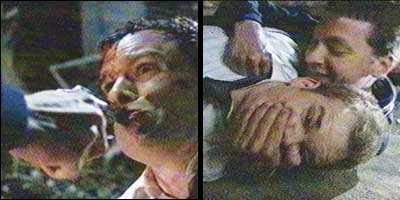
A few years back, I was truly cranky about Six Feet Under. I was bugged by its cartoon extremity, its California psychobabble, its Grand Guignol twists. Alan Ball’s show seemed overpraised to me, more Ally McBeal than Sopranos—but over the seasons I changed my mind. I grew to admire the way the series cleverly inverted its central themes: first emphasizing the thrill of sexual freedom, then its loneliness; the glory of committed love, then its claustrophobia. The relationships rang true. Theacting was brilliant. I became a fan. Or maybe I just stopped worrying and learned to love the quirk.
Then came That’s My Dog, the episode three weeks ago—a terrifying hour in which David, the show’s conscience and its richest character, played by the fabulous Michael C. Hall, picked up a scruffy hitchhiker, Jake (Michael Weston). Alternately threatening and chummy, Jake flirted with David, then robbed him, made him smoke crack, trussed him up, splashed him with gasoline, and stuck a gun in his mouth. He manipulated his captive with lies. Finally, he abandoned him, bruised and traumatized.
I felt pretty shaken up myself. And I wasn’t the only one: Like other controversial episodes, such as Dr. Melfi’s rape on The Sopranos, “That’s My Dog” became an instant cocktail controversy, sparking debate for weeks. Some felt betrayed, while others praised the show’s daring. A few found the violence gave them nightmares; some were angry at the idea that David was being “punished” for his sexuality (unnervingly, he fantasized about Jake throughout the experience). The episode’s director, executive producer Alan Poul, says the project was nicknamed “the departure episode.” “The genesis was, wouldn’t it be great to do a departure where one story line fundamentally hijacks the episode midway, and we never really return to what everyone else is doing—and have that be a pivotal event that the rest of the season would hinge off?”
But why this pivotal event? Why have a beloved character experience something so traumatic and frankly kinky—a bashing so baroque it seemed to derive from some guilt-stricken, sadomasochistic stream of David’s psyche? Poul will have none of that: “I’m gay, Alan Ball is gay; homophobic is the one thing you don’t get off calling the show. We were trying to be real to the psychology of someone who is a fundamentally nonconfrontational person—and someone who essentially believes that man is rational. Yes, there are times when David, if he was being bold, brave, and quick-witted, could have made an escape. But how many of us are bold, brave, and quick-witted under those kinds of circumstances?”
Poul’s intent was to put David and his family—and viewers as well—through something truly harrowing. “It’s going to haunt David for the rest of the season; in order for us to understand it on a gut level, we thought it was important for the audience to share a portion of David’s experience … The response is thrilling to me, because it’s causing people to debate these expectations—how do we watch a drama?”
Like many viewers, I’m of two minds. On the one hand, the episode was undeniably riveting: David’s mix of horniness, insecurity, and kindness proved highly unstable. His humanism not only failed to protect him, it made him the worst kind of mark—as when David pleaded with Jake to tell him if one story was true, and the kidnapper laughed, “No! That’s just the kind of thing people like me say to people like you to get you to feel good about yourself.”
As Poul points out, the encounter felt true to David’s character—including his fascination with rough trade. It also felt sadistic, a torment built on the blurry line between David’s vulnerability and his anxieties about his sexuality. I was basically willing to go along with David’s predicament until the pair entered the alley of gasoline and gun fellatio, and the scenario began to feel suspiciously contrived; Jake seemed more a monster from the id than a real kidnapper. I felt an uneasy sense of collusion in the role I played: as witness to the possible destruction of a character I’d grown to love.
Perhaps part of the problem is that Six Feet Under is itself about grief; mild shock is built into the series, with its opening death of the week. But a lengthy, real-time ordeal like David’s carjacking feels like a betrayal in a show we’ve watched for many years. A movie, no matter how startling, is over in two hours, and you go home. With TV, we’re committed: It’s a relationship, one that allows us to invite these characters into our bedrooms. Regular watchers rely on continuity; whether we’re watching Deadwood, reality television, or a legal procedural, there’s a structural trust few creators ever mess with.
Olivier, the show’s hilariously pretentious art teacher, once expounded that good art should literally make people vomit. David’s ordeal may not have done that, but it did cross some line in the sand, mingling “quality TV” with more visceral genres like horror and pornography—art intended to make the viewer respond physically. It’s unsurprising many viewers felt abused, and taken for a ride. But there’s something thrilling, too, about creators willing to jeopardize their unspoken contract with their audience: to risk our loyalty in the name of something new.
With reporting by Lauren DeCarlo.